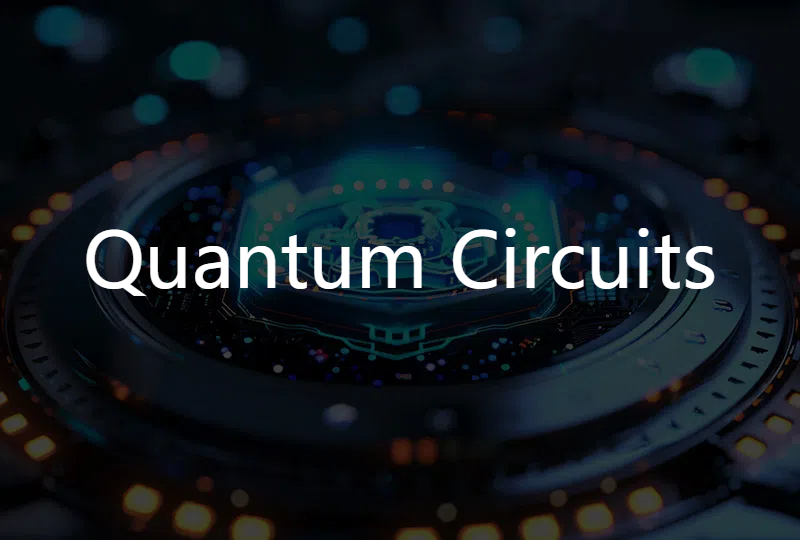Quantum Circuits: The Heart of Quantum Computing Explained
2025.03.03 · Blog quantum circuits
Quantum circuits are fundamental to the power of quantum computers. Unlike traditional computing, where binary bits (0s and 1s) process information, quantum circuits use quantum bits, or qubits. These qubits can exist in multiple states simultaneously due to a phenomenon known as superposition, making quantum circuits far more powerful than classical circuits for specific types of problems.
This article dives deep into what quantum circuits are, how they function, and why they're so critical to quantum computing advancements.

What Are Quantum Circuits?
A quantum circuit is a mathematical model that represents the flow of quantum information through a series of quantum gates. The purpose of these circuits is to manipulate qubits and enable them to perform quantum operations. Quantum circuits combine qubits, quantum gates, and measurement protocols, functioning similarly to classical circuits but with far more complex rules governed by quantum mechanics.
In a quantum circuit, qubits are manipulated by quantum gates, which perform various operations. After processing through these gates, the qubits are measured, collapsing them into definite states. The power of quantum circuits comes from the ability to create superpositions and entanglements, enabling a wide range of computational possibilities beyond classical limits.
Key Components of Quantum Circuits
Qubits: The quantum equivalent of classical bits. Unlike classical bits, qubits can exist in multiple states at once due to superposition. This makes them capable of processing exponentially more information.
Quantum Gates: These gates are the operators that manipulate qubits. Some common gates include:
Hadamard Gate (H): Creates superposition by putting a qubit in an equal probability of being both 0 and 1.
Pauli Gates (X, Y, Z): Rotate qubits around different axes on the Bloch sphere, modifying their states.
CNOT Gate: Creates entanglement by flipping the state of one qubit based on the state of another qubit.
Toffoli Gate: A universal gate used in reversible computing and quantum error correction.
Swap Gate: Swaps the states of two qubits.
Measurement: This step collapses qubits into definite states, yielding the final output of a quantum computation. Measurement results are critical for interpreting quantum computations, as quantum states are probabilistic.
How Quantum Circuits Work: A Step-by-Step Process
Quantum circuits are executed in a sequential manner, starting with qubit initialization and progressing through a series of operations:
Initialization: Qubits are set to an initial state, usually |0⟩, and prepared for quantum operations.
Quantum Gates Application: Quantum gates are applied to the qubits in a specific sequence. These gates manipulate the qubits through processes like superposition and entanglement, performing complex calculations.
Entanglement and Superposition: During the quantum computation, qubits interact and become entangled. Superposition allows qubits to exist in multiple states at once, while entanglement links the qubits' states such that the measurement of one qubit will affect the others.
Measurement: Finally, qubits are measured, and the quantum state collapses into a classical result (0 or 1). The outcome is the solution to the quantum algorithm.
This process can run in parallel, enabling quantum computers to outperform classical computers in solving certain types of problems.
The Role of Quantum Circuits in Quantum Algorithms
Quantum circuits are used to implement key quantum algorithms, enabling quantum computers to solve complex problems faster than traditional computers. Some well-known quantum algorithms include:
Shor's Algorithm: Used to efficiently factor large numbers, posing a potential threat to current cryptographic systems. This is a major area of focus for quantum cryptography.
Grover's Algorithm: A search algorithm that can search through an unsorted database quadratically faster than classical algorithms.
Quantum Approximate Optimization Algorithm (QAOA): A quantum algorithm used for solving optimization problems, relevant to industries such as logistics, finance, and manufacturing.
Quantum Machine Learning (QML): Quantum circuits are leveraged to accelerate machine learning models and improve their efficiency in processing large datasets.
These algorithms depend heavily on the structure and design of quantum circuits to execute their operations efficiently.
Applications of Quantum Circuits Across Industries
The impact of quantum circuits extends across numerous fields, including:
Cryptography: Quantum circuits can potentially break widely used encryption schemes, but they also enable the creation of quantum-safe cryptographic methods, ensuring data security.
Optimization: From supply chain management to traffic flow, quantum circuits help solve optimization problems faster than classical methods.
Drug Discovery & Healthcare: Quantum circuits accelerate simulations of molecular interactions, which could revolutionize drug discovery and personalized medicine.
Artificial Intelligence & Machine Learning: Quantum circuits enhance AI models, enabling faster data processing and more accurate predictions.
Challenges in Quantum Circuits
While quantum circuits have immense potential, there are significant challenges that need to be addressed:
Decoherence: The loss of quantum coherence over time, which causes errors in quantum computations.
Error Correction: Quantum circuits are highly susceptible to errors due to noise and interference. Developing effective quantum error correction techniques is an ongoing area of research.
Scalability: Building larger and more stable quantum circuits is a critical hurdle for quantum computers to tackle complex real-world problems.
The Future of Quantum Circuits
Researchers are pushing the boundaries of quantum circuits by improving qubit stability, reducing noise, and developing more efficient gate operations. As quantum hardware advances and quantum algorithms become more refined, quantum circuits will become more practical for real-world applications. This progress could lead to significant breakthroughs in fields like cryptography, AI, and drug development.
Conclusion: The Key to Quantum Advancements
Quantum circuits are at the heart of quantum computing's future. They enable quantum computers to solve problems that were once considered impossible for classical machines. As we continue to explore and improve quantum circuits, the possibilities for technological advancements across industries are boundless. Understanding quantum circuits is crucial for anyone interested in the future of computing, and they will undoubtedly shape the next generation of computational breakthroughs.
Featured Content






